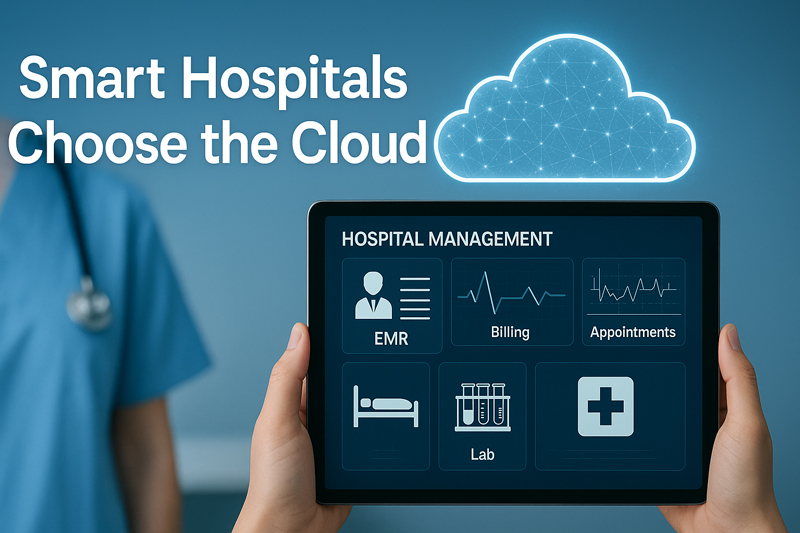Why Smart Hospitals are Moving to Cloud-Based HMS Solutions
July 2, 2025In an era where time, data, and precision define the future of healthcare, smart hospitals are making a clear shift — from legacy systems to cloud-based Hospital Management Software (HMS). This transformation is more than just a technological upgrade; it’s a strategic move toward efficiency, scalability and patient-centric care.
🌐 The Changing Landscape of Hospital Management
Today’s healthcare providers face new challenges:
- Rising patient expectations
- Complex regulatory requirements
- The need for real-time data access
- Pressure to reduce operational costs
Traditional offline HMS or paper-based systems simply cannot keep pace with the modern hospital ecosystem. That’s where cloud-based HMS steps in — offering hospitals a powerful digital backbone.
☁️ What Is a Cloud-Based HMS?
A cloud-based Hospital Management System is a secure, web-enabled solution hosted on cloud infrastructure that enables anytime, anywhere access to hospital operations — from OPD/IPD management and billing to inventory, EMR, lab reports, and appointment scheduling.
It empowers hospitals to:
- Automate workflows
- Minimize human error
- Centralize patient records
- Enable telemedicine & remote access
- Ensure data is secure, backed-up, and compliant
✅ Top Reasons Why Smart Hospitals Are Migrating to Cloud-Based HMS
1. Real-Time Access Across Departments
Doctors, nurses, admins, and lab staff can collaborate in real-time, regardless of their physical location — ideal for multi-center hospitals, mobile health units and chain hospitals.
2. Faster Decision-Making with Centralized Data
With cloud-hosted EHRs and reports, clinicians get instant access to patient histories and test results, enhancing clinical decision-making and reducing delays in treatment.
3. Scalability Without Infrastructure Hassles
As hospitals grow, so do their data and software needs. Cloud-based HMS solutions scale effortlessly without costly server upgrades or IT teams.
4. Enhanced Data Security & Compliance
Most modern cloud HMS platforms comply with standards like HIPAA, NABH, and ISO. With encrypted backups, role-based access, and audit trails, data breaches and loss are minimized.
5. Lower Total Cost of Ownership (TCO)
Unlike on-premise solutions that demand heavy upfront investments, cloud-based HMS runs on affordable monthly subscriptions. No hardware. No IT headaches.
6. Contactless, Mobile-First Experience
With built-in tools for WhatsApp notifications, online appointment booking, and mobile dashboards, cloud HMS offers patient engagement on the go — a must-have in today’s digital-first world.
7. Rapid Implementation & Updates
Cloud-based systems are easier to deploy and update. No downtime. No technician visits. Hospitals always stay on the latest version with new features rolled out seamlessly.
🏥 Real-World Impact: How Hospitals Are Benefiting
Many forward-thinking hospitals across India and beyond are seeing transformative benefits:
- 40% faster OPD processing
- Reduction in billing errors by 70%
- Improved patient retention through better follow-up mechanisms
- Centralized control over multiple branches and departments
📈 The Smart Hospital Checklist for 2025
If your hospital aims to:
- Reduce administrative burdens
- Deliver better patient outcomes
- Gain a competitive digital edge
- Ensure long-term data security
Then it’s time to consider what cloud-based HMS platforms can offer — not just for IT teams, but for clinical excellence and financial performance.
🧩 Final Thoughts
The shift to cloud is no longer a trend — it’s a strategic necessity. As healthcare becomes more connected and personalized, cloud-powered HMS will be the nerve center of hospital operations.
Want to understand how this fits into your hospital’s roadmap?
👉 Schedule a discovery call with our HMS consultants — to explore digital possibilities.
